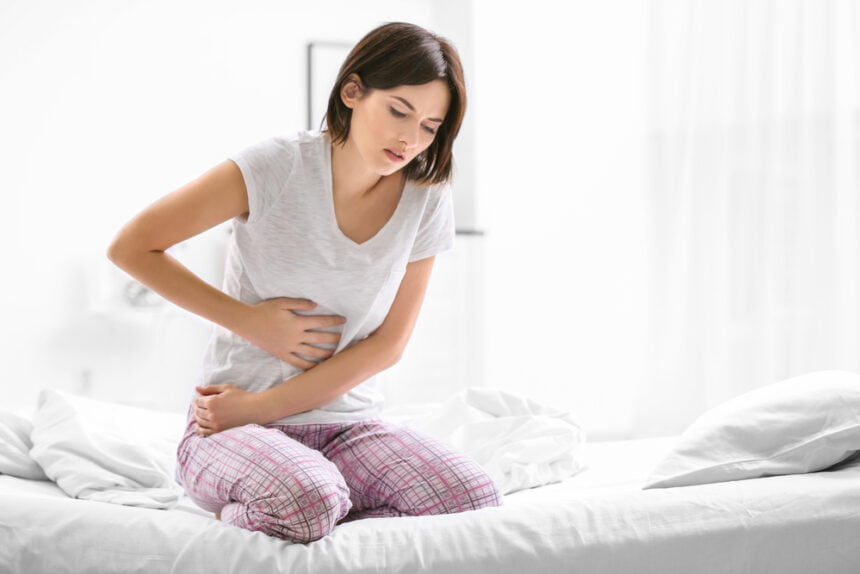Abdominal pain is one of the common symptoms that affects individuals of all ages and genders. However, women may experience abdominal pain for various reasons related to their unique anatomy and reproductive system. Let us delve into the details of abdominal pain in women, its types.
Abdominal Pain in Women
Abdominal pain in women is a symptom that can arise from various sources, including gastrointestinal, gynecological, and urological issues. It is essential to pay attention to abdominal pain, as it can be indicative of underlying medical conditions or reproductive health concerns. There are different types of abdominal pain such as upper and lower abdomen pain in females. Here, we’ll discuss some common types of abdominal pain in women, with a focus on lower abdominal pain.
Types of Abdominal Pain in Women
1. Lower Abdominal Pain
Menstrual Cramps (Dysmenorrhea): Lower abdomen pain in females or cramping during their menstrual periods is common. This pain is caused by uterine contractions as it sheds its lining. For some, these cramps can be severe and debilitating.
Ovulation Pain (Mittelschmerz): Some women experience a brief, acute pain on a side of the lower abdomen during ovulation. This is typically due to the release of an egg from the ovary.
Pelvic Inflammatory Disease (PID): PID is a common infection occur in the reproductive organs, often caused by sexually transmitted infections (STIs). Lower abdominal pain, along with fever and vaginal discharge, is a common symptom.
Endometriosis: This chronic condition arises when tissue similar to the uterine lining grows on the outside of the uterus. It often causes severe lower abdominal pain, especially during menstruation.
Ovarian Cysts: Ovarian cysts are fluid sacs which can develop on the ovaries. When they rupture or become enlarged, they can lead to lower abdominal pain.
2. Upper Abdominal Pain
Gastrointestinal Issues: Conditions like gastritis, gallbladder disease, or pancreatitis can cause upper abdominal pain. It may be accompanied by symptoms like indigestion, nausea, or vomiting.
Liver or Kidney Problems: Liver or kidney issues can lead to referred pain in the upper abdomen. Liver disease may cause right upper abdominal pain, while kidney problems can cause pain in the upper back that radiates to the front.
Pregnancy: Upper abdominal pain during pregnancy can be due to conditions like preeclampsia or gallbladder issues. It’s crucial for pregnant women to seek immediate medical attention if they experience such pain.
3. General Abdominal Pain
Irritable Bowel Syndrome (IBS): IBS can cause varying degrees of abdominal pain, often accompanied by alterations in bowel habits like diarrhea or constipation.
Urinary Tract Infections (UTIs): UTIs can cause lower abdominal pain along with symptoms like frequent urination and burning during urination.
Bladder Issues: Conditions such as interstitial cystitis or bladder infections can lead to generalized abdominal discomfort.
Appendicitis: This condition typically presents with sudden, severe pain in the lower right abdomen. Appendicitis is an emergency that requires immediate surgical intervention.
Seeking Medical Attention
While some causes of abdominal pain in women may be benign, others can be signs of serious medical conditions. Therefore, it is crucial to seek medical attention when experiencing persistent or severe abdominal pain, especially if accompanied by other concerning symptoms such as fever, vomiting, vaginal bleeding outside of menstruation, or changes in bowel or urinary habits.
Impact of Abdominal Pain in Women:
Abdominal pain in women can have a significant impact on various aspects of their lives. The effects can vary depending on the cause, severity, and chronicity of the pain. Here are some ways abdominal pain can affect women:
Physical Impact
Discomfort and Pain: Abdominal pain itself can cause significant discomfort and pain, affecting a woman’s ability to perform daily activities and concentrate on work or personal responsibilities.
Fatigue: Chronic abdominal pain can lead to fatigue and decreased energy levels, making it challenging to maintain an active lifestyle.
Changes in Appetite: Abdominal pain can influence appetite, potentially leading to changes in eating habits and weight loss or gain.
Gynecological Impact: If the pain is related to gynecological issues like endometriosis or ovarian cysts, it can disrupt menstrual cycles, fertility, and sexual function.
Digestive Problems: Abdominal pain associated with gastrointestinal issues may lead to digestive problems such as diarrhea, constipation, or indigestion.
Emotional Impact
Anxiety and Stress: Persistent or recurrent abdominal pain can cause anxiety and stress, as women worry about the cause, severity, and impact on their lives.
Depression: Chronic abdominal pain can contribute to the development or exacerbation of depressive symptoms, affecting mood and overall mental health.
Irritability: Constant pain can make women more irritable, affecting relationships with family, friends, and colleagues.
Reduced Quality of Life: The pain may limit participation in social activities, hobbies, and exercise, resulting in a reduced quality of life.
Lifestyle Impact
Work and Productivity: Severe abdominal pain may lead to missed workdays, decreased productivity, and potential career setbacks.
Financial Stress: Frequent medical appointments and treatments can result in financial stress due to healthcare costs and potential loss of income.
Relationships: Abdominal pain can strain personal relationships due to changes in mood, reduced intimacy, and limited participation in social events.
Sleep Disturbance: Pain can interfere with sleep, leading to sleep disturbances and further exacerbating physical and emotional well-being.
Self-Care Neglect: Women experiencing chronic abdominal pain may neglect self-care practices such as exercise, healthy eating, and stress management.
How to Manage Abdominal Pain and Lead a Healthy Lifestyle?
While abdominal pain can be challenging to deal with, there are strategies women can adopt to lead a healthier lifestyle despite its impact:
Medical Evaluation and Treatment
Consult a Healthcare Provider: Seek medical advice to determine the cause of abdominal pain. A thorough diagnosis and check-up are vital for effective treatment.
Follow Treatment Plans: Adhere to treatment plans prescribed by healthcare providers, whether they involve medication, lifestyle changes, or surgical intervention.
Pain Management
Pain Management Techniques: Learn and practice pain management techniques like deep breathing, meditation, or yoga, to alleviate pain and reduce stress.
Nutrition and Diet
Balanced Diet: Follow a balanced diet that supports overall health. Avoid trigger foods that exacerbate abdominal discomfort.
Hydration: Stay always hydrated by drinking plenty of water, which can aid digestion and prevent constipation.
Exercise
Regular Physical Activity: Indulge in regular physical activity as recommended by a healthcare provider. Exercise can improve overall well-being, reduce stress, and help with weight management.
Adapt to Limitations: If abdominal pain limits physical activity, consider low-impact exercises like swimming or walking, which are easier on the body.
Stress Management
Stress Reduction Techniques: Practice stress reduction techniques such as mindfulness, relaxation exercises, or counseling to manage anxiety and emotional well-being.
Mind-Body Practices: Explore mind-body practices like tai chi or qigong, which can help alleviate pain and improve mental health.
Self-Care
Prioritize Self-Care: Make self-care a priority by allocating time for activities you enjoy, relaxation, and leisure, even if they need to be adapted to accommodate pain.
Set Realistic Goals: Set achievable goals for personal and professional life, taking into account the limitations posed by abdominal pain.
Medication Management
Medication Adherence: If prescribed medications, adhere to the recommended dosages and schedules, and report any adverse effects to healthcare providers.
Coping Strategies
Coping Mechanisms: Develop healthy coping mechanisms for dealing with the emotional and physical challenges of living with abdominal pain.
Abdominal pain in women can have far-reaching physical, emotional, and social effects. However, with proper medical evaluation, treatment, and lifestyle adjustments, women can lead healthy lives despite the odds of abdominal pain.
Conclusion
Abdominal pain in women is a complex symptom that can have various causes, including gynecological, gastrointestinal, and urological issues. Lower abdominal pain, in particular, can be associated with a wide range of conditions, from menstrual cramps to serious diseases like ovarian cysts or pelvic inflammatory disease.
Understanding the type and source of abdominal pain is essential for proper diagnosis and treatment. Women should not ignore abdominal discomfort and should consult with a healthcare provider to determine the underlying cause and receive appropriate care. Early detection and intervention can lead to better outcomes and improved overall health and well-being.








